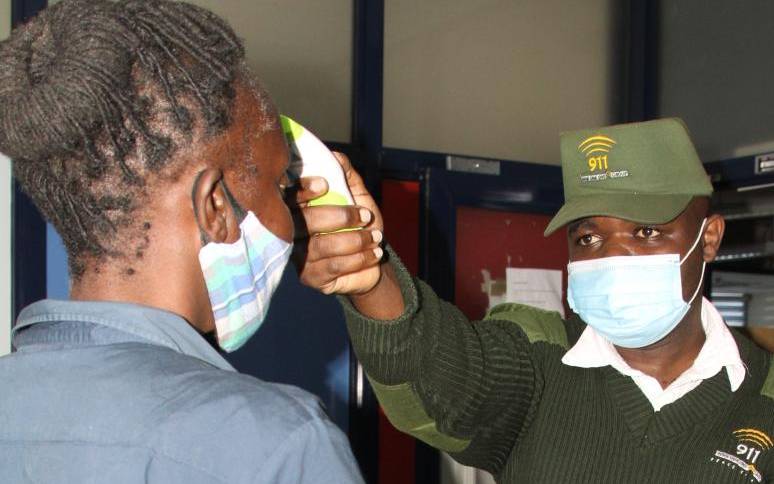
Moses Musa, a security guard with 911 company takes body temperature from Emmaculate Wakungu, a visitor at Standard Group in Nairobi, on Wednesday, July 22, 2020. Most security guards are at risk of being infected with Covid-19 owing to their nature of work. [David Njaaga, Standard]
With the escalation of Covid-19 cases, Stella (not her real name), a security guard working in Nairobi, has confronted new threats she never anticipated when she took up the job.
For 12 hours a day, six days a week, Stella’s work includes taking body temperatures and giving out hand sanitisers to hundreds of people entering a busy building in Nairobi, who she interacts with. Stella admits the work puts her at a higher risk of contracting Covid-19 than the average Kenyan.
But Stella’s biggest fear is not contracting the virus, rather, she fears taking it home to her two-year-old daughter.
She tells The Standard of the cautious routine she has adopted since the virus arrived on Kenyan shores.
“My priority when I arrive home is washing my hands. I remove the clothes and store them in a safe area, where I can wash on my off day, then I take a shower,” she says.
After this thorough procedure, Stella heads to a daycare centre near her home to pick up her daughter.
However, Stella is not the only concerned by the risks of the job, as a security guard.
Like Stella, Frankline Mung’ombe, a private security guard attached to a fast food restaurant in Nairobi, says he courageously confronts each day to help protect others.
“Sometimes I feel like taking off my mask because I cannot breathe properly. But given the nature of my job, I suppress the urge because I want to keep my son safe,” says Mung’ombe, who became a father just two and a half months ago.
Safety precaution
The arrival of his son has forced Mung’ombe to take the necessary precautions at work and at home.
However, he also admits that he finds it difficult to adequately protect himself since he has not received any training or protective gear aside from masks.
“We get three masks every week, but we have not received any special training on handling Covid-19,” Mung’ombe tells The Standard in between checking temperature and handing out a sanitiser to clients trooping into the restaurant.
“It is tough because you don’t know the background of every person. You have to risk,” says Frank Omondi, another guard working with a private security company in Nairobi.
To keep safe, Omondi says he is taking necessary precautionary measures like wearing masks and maintaining the required social distance.
However, it is challenging for the guards to keep a safe distance due to the little support accorded them by their employers. Omondi’s employer only provides the guards with sanitisers and a thermogun. Like other employees in the same company, Omondi says he has to use his money to buy masks or any other protective gear he deems necessary to wear on the job.
Many of the guards interviewed revealed they had not received adequate training or protective equipment such as masks, sanitisers or gloves from the security companies they work for.
Stella, for instance, says her employer never offered any training to her on Covid-19, though the firm she has been seconded to guard gave them a drill on the same.
In case an individual displays symptoms of Covid-19, Stella says, there is a special protocol to be followed.
“If the temperature is high, we take two or three more tests. We take the person to an isolation room and alert the supervisor for further action,” she says.
Mung’ombe, on the other hand, says the fast-food restaurant he works for has instructed him not to let in any person displaying Covid-19 symptoms.
“We report to the supervisor and hold the person outside the building. If the person becomes rowdy, we press the panic button,” says Mung’ombe.
But there are other challenges the guards have to endure on the frontline of Covid-19, especially rude and uncooperative clients.
“Sometimes people become rude when you ask to take their temperature. Some refuse to use the sanitiser. It is very challenging,” Stella says.
Kenya National Private Security Workers’ Union (KNPSWU) secretary-general Isaac Andabwa acknowledged the guards’ plight. He said the government has neglected to offer any welfare support to guards on the frontline in the fight against Covid-19 spread.
Professional challenges
Andabwa insists private security personnel are not adequately prepared to tackle Covid-19, yet are the most vulnerable, as they are the first to interact with any person getting into any building or company premises. These challenges epitomise the difficulties that have rocked the security profession for years.
Despite being on the frontline protecting Kenyans and risking contracting Covid-19, Andabwa says security guards countrywide have problems of low pay and lack of medical insurance. The average salary of a security guard ranges between Sh15,000 and Sh30,000.
 The Standard Group Plc is a multi-media organization with investments in media
platforms spanning newspaper print
operations, television, radio broadcasting, digital and online services. The
Standard Group is recognized as a
leading multi-media house in Kenya with a key influence in matters of national
and international interest.
The Standard Group Plc is a multi-media organization with investments in media
platforms spanning newspaper print
operations, television, radio broadcasting, digital and online services. The
Standard Group is recognized as a
leading multi-media house in Kenya with a key influence in matters of national
and international interest.











